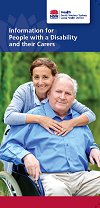People with disabilities will be treated with respect and have the same quality of service and health outcomes as other members of the community. We will work in partnership with people with disabilities and other agencies to meet this commitment.
Pl anning Ahead
anning Ahead
Find out things such as
Inform hospital staff about
Accessible Parking and Transport
Hospitals have areas where patients can be dropped off as accessible parking. Parking fees apply to most hospital car parks. If you visit the hospital regularly and have difficulty meeting parking costs, speak to the hospital’s Patient Liaison Officer.
http://parking.health.nsw.gov.au/
Accessible Toilets
All hospitals will have accessible toilets for people with disabilities.
Ask at Emergency, Admissions or the Preadmission clinic for an accessible map which shows where accessible toilets and other facilities are located.
Equipment
Please advise Preadmission clinic or ward staff if you require equipment during your hospital stay so this may be organised prior to you being admitted. Staff also need to be advised if you are bringing your own equipment.
At the time of your discharge if a need for equipment is identified an Occupational Therapist or Physiotherapist can assist you with loan, hire or purchase information.
Interpreters
Auslan (sign interpreters) are available on request. If you do not speak English well hospital staff can arrange an interpreter through the Health Language Service for you. Sometimes you may need to wait for an interpreter as they are in high demand.
Communication Aids
Each hospital has some communication aids available such as TTY machines for the hearing impaired. If you have a Communication Board please bring it with you. Advise staff if you are bringing your own communication aids.
Support Needs
If you have your own health record (the Red book) or a Community Services Plan bring this with you.
Talk to Health Care staff about any specific care requirements such as assistance in washing, toileting, feeding, or getting around the hospital. Also let staff know about any therapy or other services you normally use at home so that suitable arrangements can be made for your care during and after your hospital stay.
Guide Dogs
Tell staff if you would like guide dog to be with you while in hospital so this can be arranged.
Outpatient Visits
Please advise clinic or department staff before your appointment of any specific equipment or care needs.
Carers
You must give your permission before health staff can talk to your family and/or carer(s) about you.
Ensure this permission is written in your medical record by staff. If you are unable to give permission, your family or carer can ask staff about options available to them.
The brochure "Information for Family and Carers" provides more information for carers. Phone the SWSLHD Cares' Program on 4654 6265for a brochure (also see SWSLHD website)
A carer may be able to stay over night at the hospital or bedside. Ask about this early so that this can be arranged where appropriate.
Rights and Responsibilities Brochure
If you wish to clarify your patient rights and responsibilities ask for a copy. It is available in 10 community languages.
Getting Involved
Most hospitals have committees which welcome input from people with a disability or their carers. Your contact person is the Patient Liaison Officer.
Participation in Care
Health staff must actively involve both you and, where appropriate, your carer(s) in decisions about care and treatment. This applies to your hospital stay, follow-up plans for community services and your GP on transfer of care.
Disability Support
Most hospitals have a Clinical staff member who can assist people with disabilities where normal hospital procedures for access and care planning do not meet their needs. Speak to the Patient Liaison Officer who will put you in contact with the right person.
Complaints and Compliments
If you have concerns about your treatment in hospital on ongoing care discuss these with a staff member such as a nurse, doctor or other health professional who is part of your care team, or speak to the Patient Liaison Officer.
If you still have concerns contact the Patient Liaison Officer who can provide further information, investigate your concerns and provide feedback.
We also like to hear your positive feedback.
South Western Sydney Local Health District Contact Details
| Mental Health | 1800 011 511 |
| Bankstown - Lidcombe | 9722 8000 |
| Bowral | 4861 0200 |
| Braeside | 9616 8600 |
| Campbelltown & Camden | 4634 3000 |
| Carrington Centennial | 4659 0590 |
| Community Health Services | 4633 4140 |
| Drug Health | 9616 8586 |
| Fairfield | 9616 8111 |
| Liverpool | 8738 3000 |
| Population Health | 9612 0706 |
| Sydney Dental Hospital | 9293 3333 |
| Karitane | 9794 2300 |
For Assistance or Information
Contact the Patient Liaison Officer at any hospital. The position may also be referred to as the Patient Representative.
Most hospital web pages have a Facility access map or Transport/ Disability Access Guide
South Western Sydney Local Health District Website: https://www.swslhd.health.nsw.gov.au/
Advance Care Planning
It may be important for you and your family/carer to discuss the kind of care you would want if you cannot speak for yourself at some time in the future. You can communicate your wishes to your family and/or complete a Statement of Values & Wishes and ask staff to include this in your medical record. See www.mywishes.org.au